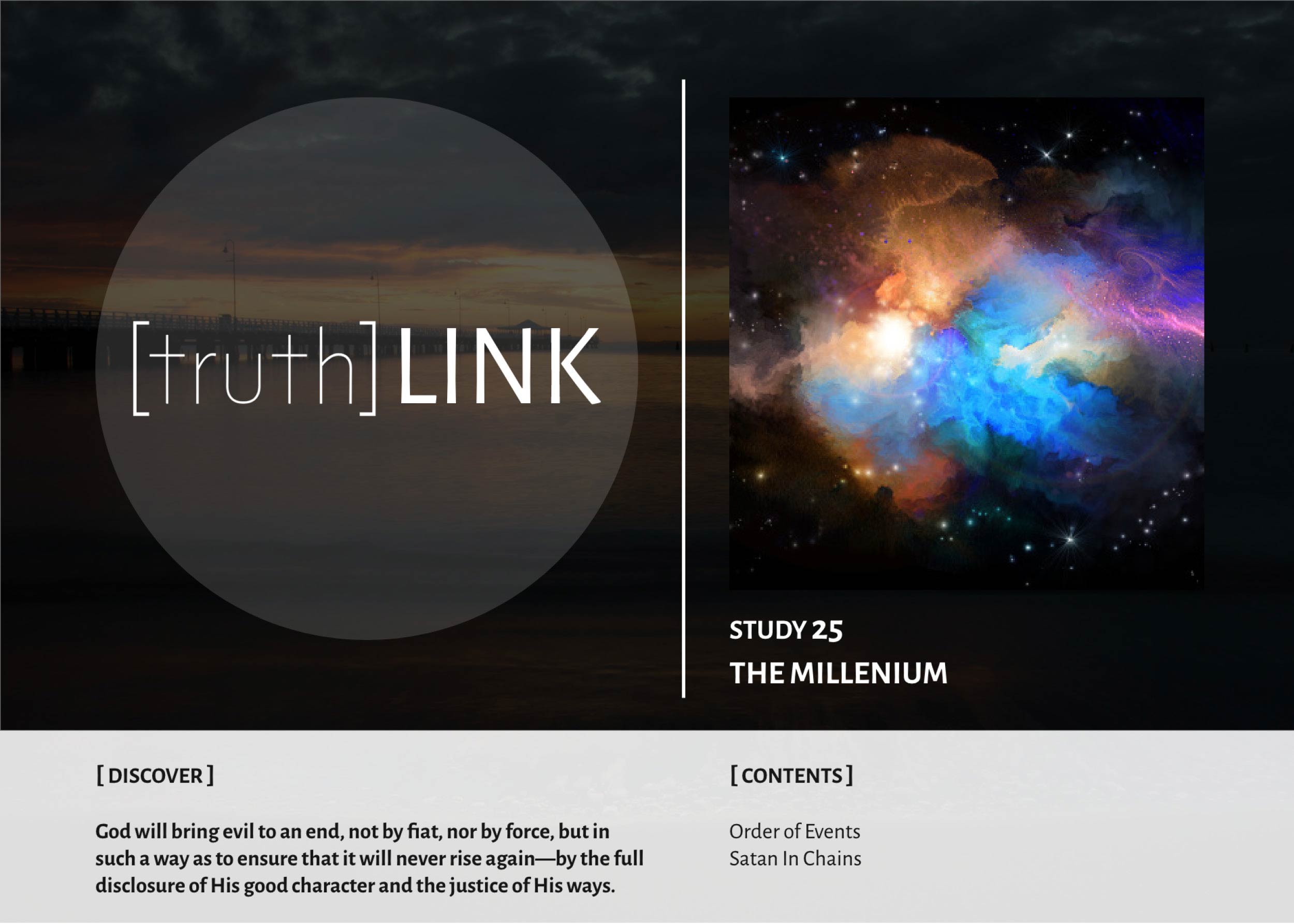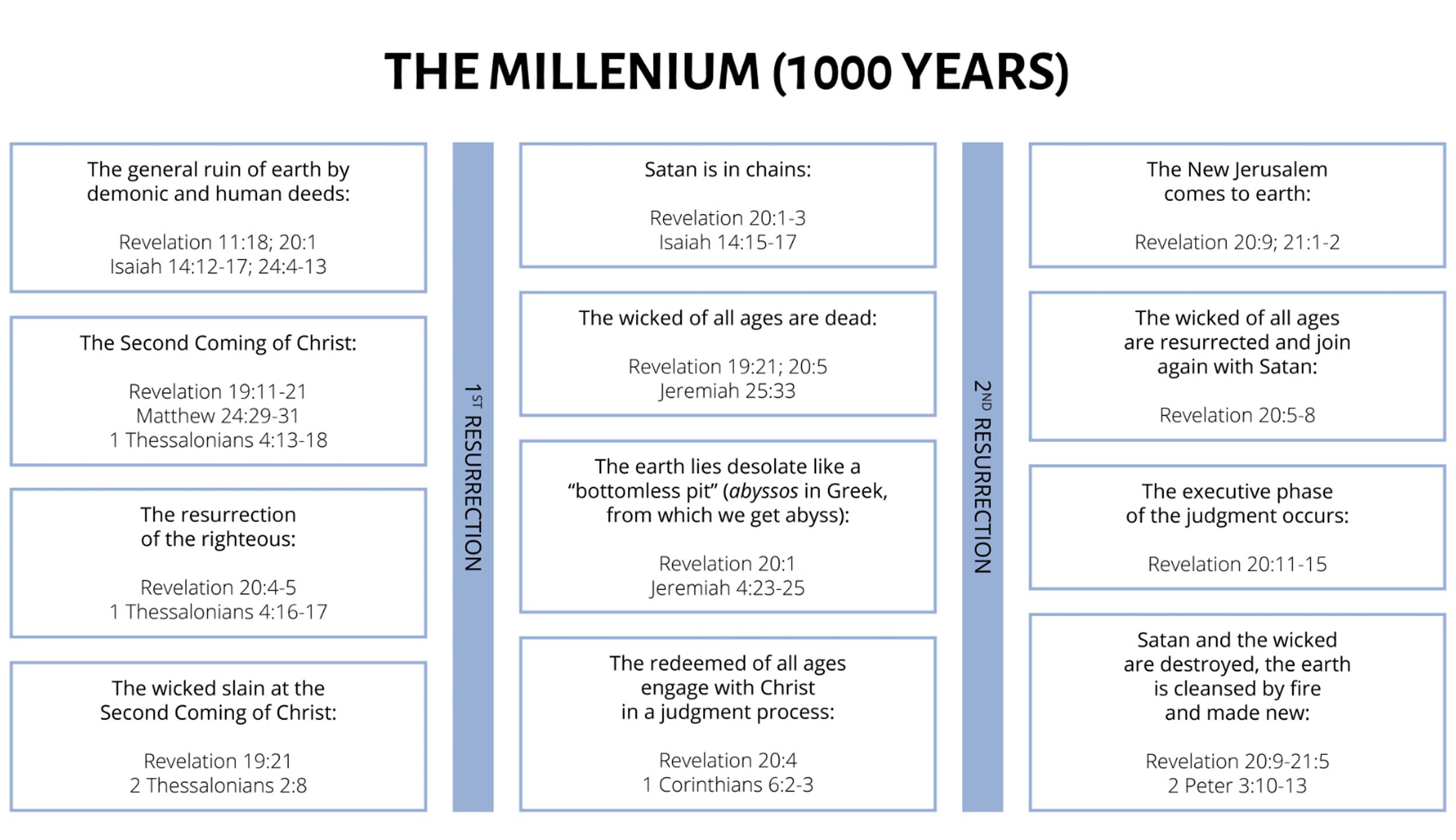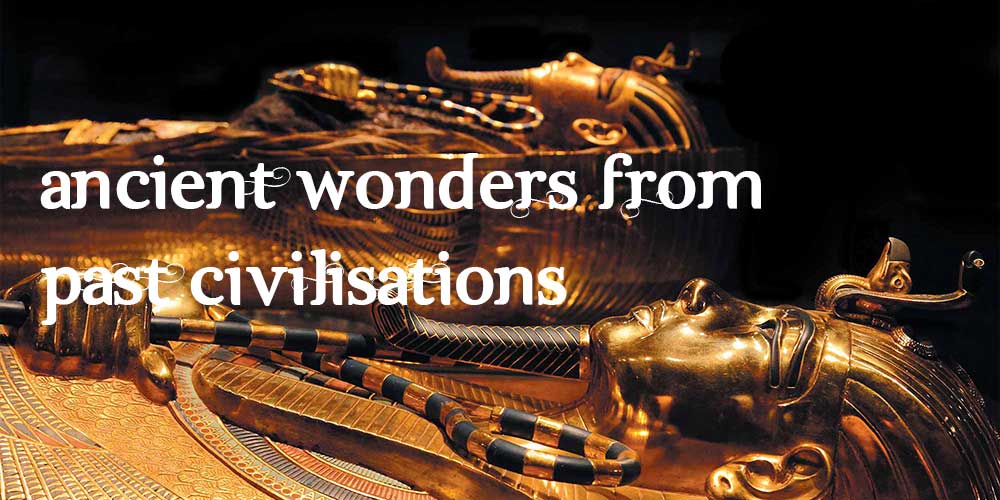
Order of Events Surrounding the Millennium
When the Great War between good and evil is over, voluntary love alone will pulse with pleasure in every heart. To facilitate complete resolve and emotional healing regarding human history in general, and regarding all individual cases in particular, the Bible teaches that God will provide a special 1000-year period commonly referred to as the Millennium. During this time, God will bring His redeemed children into an open process of judgement in which they will evaluate for themselves the entire record of evil’s reign in our world and His conduct in bringing it to an end.
In this study we will first map out the various events surrounding the Millennium, and then we will discover the full-disclosure process through which God will guide His redeemed children during the Millennium.
There are four main events that occur just prior to the Millennium, four that transpire during, and four that happen after. Explore each of the events by reading and discussing the scriptures provided in the following chart:

Satan in Chains
Read Revelation 20:1-3. What does it mean that Satan is “bound” with “a great chain” in a “bottomless pit” during the Millennium?
This idea has its Old Testament parallel in the sanctuary ceremony regarding the scapegoat, Azazel, which symbolized Satan (Leviticus 16). After atonement had been symbolically made by the sacrifice of the Lord’s goat, which pointed to the atoning death of Christ, the sins of the people were placed on the scapegoat to indicate that Satan bears primary responsible for sin as its originator and instigator. Then the scapegoat was led by the hand of a fit man into the wilderness. According to the scapegoat ceremony, there will come a point in the unfolding of the great war between good and evil when Satan’s gig will be up. Revelation 20 reveals the same point in Satan’s progressive demise. The events leading up to the Millennium—most significantly, the revelation of God’s true character by the worldwide proclamation of the gospel—will serve to bring Satan’s long career of deception to an end. He will be bound, as it were, by a chain of events that will drain him of his power and credibility, “that he should deceive the nations no more” (Revelation 20:3).
The prophet Isaiah also depicted this very point in Satan’s downfall: “You shall be brought down to Sheol, to the lowest depths of the _____. Those who see you will gaze at you, and _____________ ______, saying: ‘Is this the man who made the earth tremble, who shook kingdoms, who made the world as a __________and _____its cities, who did not open the house of his prisoners?’” (Isaiah 14:15-17).
In other words, people will come to realize that Satan, with his self-serving principles, was the main force behind all the destruction and ruin brought upon our world. The truth of the gospel will vindicate God’s character and place primary responsibility for evil and suffering where it really belongs—on Satan, the scapegoat.
Why the Millennium?
Which brings us to an obvious and important question: What is the reason for the Millennium? What will the redeemed be doing with Christ during this special 1000-year period of time? Revelation 20:4 provides us with the answer:
“And I saw ___________, and they ______ on them, and _________was committed to them…And they lived and reigned with Christ for a thousand years.”
This gives us astounding insight into the kind of God we’re dealing with, how He chooses to govern, and how He intends to bring complete resolve to the problem of evil. During the Millennium God will seat His redeemed people on “thrones” and commit “judgment” to them.What does this mean?
In Scripture, the word “judgment” essentially means to discern and do what is right. When we say that a person has good judgment, we mean that they have good discernment, that they accurately perceive what is right and wrong and fair in situations. A “throne” in Scripture signifies the position of authority from which justice—righteousness and fairness—is to proceed (Psalm 97:2; Hebrews 1:8). God always discerns and does what is right. Therefore, He always occupies the throne with justice (Psalm 89:4; Isaiah 9:7). Fallen human beings lack the moral integrity, perception, and emotional strength to occupy throne status with justice, which is evident throughout the history of our worlds failed monarchies. But here we see that before entering into the executive phase of the judgment that takes place after the Millennium, God will do something remarkable: He will invite the redeemed to judge His judgments, to evaluate for themselves the history of the great controversy between good and evil, to assess all the factors that have contributed to each person’s eternal destiny. Now that they are on the other side of evil’s reign and completely healed of all anti-love impulses, they are prepared to render just judgment as they process all the data pertaining to the cases of all who are eternally saved and all who are eternally lost.
While reproving the church at Corinth for failing to exercise good judgment in their own small, local matters, Paul projected forward to the far greater work of judgement the redeemed will engage in during the Millennium:
“Do you not know that the saints will judge the world? And if the world will be judged by you, are you unworthy to judge the smallest matters? Do you not know that we shall judge angels?” (1 Corinthians 6:2-3).
The point is, that God operates on the principle of full disclosure. He does not desire a forced, confused, or terrified obedience, but only voluntary love arising from minds that understand Him and hearts that like what they see in Him. Of course God Himself knows everything pertaining to each person’s case and He knows that all His judgments are just. But He wants the redeemed to know the whole truth for themselves with complete satisfaction and resolve. Why is this person saved and that person lost? What overtures did God make and what opportunities did He provide for him, for her, and how did each one respond? It is perfectly natural for rational, freewill beings to have questions about what is just, right, and fair. During the Millennium God invites our questions, submitting Himself to our scrutiny, knowing we will find Him to be just and true in all His ways.
“He is the Rock, His work is __________; for _____ His _______ are ____________, a God of truth and without injustice; righteous and upright is He” (Deuteronomy 32:4).
God is absolutely consistent within Himself to always remain faithful, just, and good. For one thousand years God will seat His children upon thrones and commit judgment to their trust. Every question they have regarding the conflict between good and evil will be answered. Every person’s case will be evaluated, all evidence will be considered, and with one free, rational voice the redeemed will judge that God is “just and true” in all His ways (Revelation 15:3; 16:5-7; 19:2).
[CONNECT]
The Bible teaching on the Millennium is based on the premise that God governs with justice and full transparency.
The book of Isaiah opens with the call, “Hear, O heavens, and give ear, O earth! For the Lord has spoken: ‘I have nourished and brought up children, and they have rebelled against Me’” (Isaiah 1:2). Here the rational inhabitants of heaven and earth are addressed in a manner that solicits evaluation (See Revelation 12:12). Amazingly, God is asking creatures He has made to employ their minds to assess His actions. Later, in Isaiah 5, a song is sung about God’s love and care for Israel and her unprovoked rebellion against Him. Then God says, “Judge, please, between Me and My vineyard (Israel). What more could have been done to My vineyard that I have not done in it?” (Isaiah 5:3-4). Here God asks thinking minds to “judge” between Him and Israel and to tell Him if He could have done something more to be worthy of her faithfulness. Incredibly, God voluntarily makes Himself accountable to those He has made. He is under no obligation to do so except—and this is the whole point—by virtue of the obligation that arises from the authenticity and integrity of who He is. If He wanted to, He could simply dominate or destroy us and be answerable to nobody—if He wanted to. But He doesn’t want to. And why not? Well, because God governs by the goodness of His character, not by the sheer strength of His power! By right, not by might!
[EXPERIENCE]
I am in awe of God’s goodness and it is my decision to trust Him for just judgment regarding myself and all other human beings.
When God seats me upon a throne in His presence and invites my judgment, I fully anticipate that I will be confirmed in the confidence I now place in Him through Jesus Christ. As the history of each person is reviewed, it will be made clear that God did all that could possibly be done to save every person and that the decision He has made regarding each one is in exact harmony with the justice that consistently flows from His good character of love.
Phone 1300 300 389























